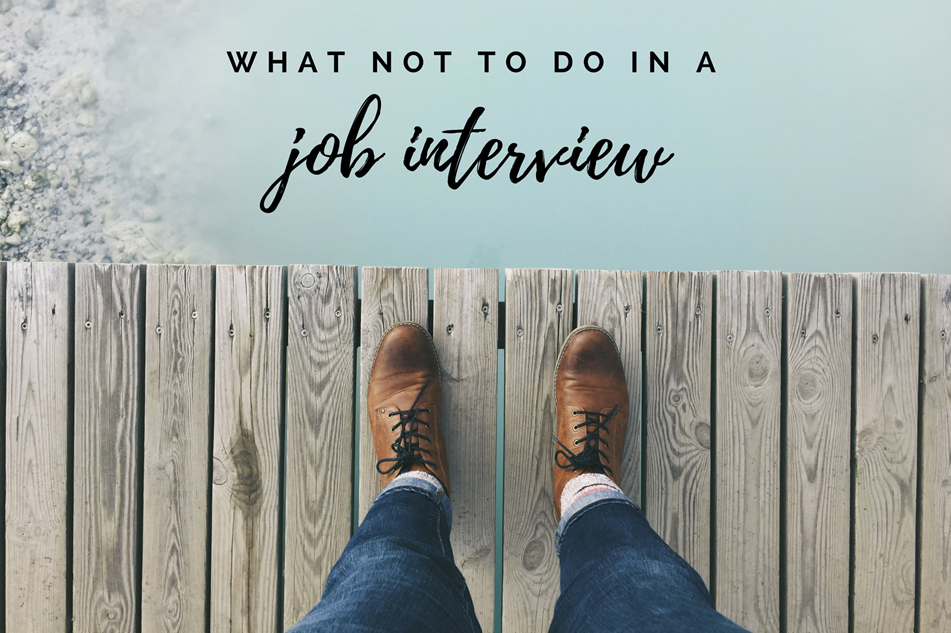|
|
CNBC has a new show called The Job Interview. It exhibits real people interviewing for real jobs with real employers. There are 20 cameras capturing all the nerve-wracking nuances of an interview. And all the mistakes. Those of which you can learn from and not make in your own interviews.
However, if you don’t have the trained eye of a career coach, you probably won’t pick up on many of the mistakes just by watching the show. So, I’ve taken the first episode and broken it down for you to see the little things most job candidates don’t know they’re doing wrong. And to be fair, I’m also pointing out some of the things they’re doing right.
Here’s the 20-minute episode, along with my commentary at various time markers. See if you pick up on the same things I’m noticing. What can you learn from what you see?
(Sorry, the full episode is no longer available on YouTube. Here’s the link to the on-demand version of the episode.)
What NOT to Overlook (3:06)
One of the qualifications for the job is someone who is detail-oriented. You’ll notice how the interviewers are pouring over the resumes, looking for the smallest of mistakes to determine if each candidate is indeed detail-oriented or not. One interviewer noticed how on one resume the text was off just half a space.
My clients wonder why I nit-pick their resumes. This is a perfect example of why I do. As I’ve said in previous blogs and in my video guides, employers are looking for reasons to throw out your resume. Not reasons to keep it.
What NOT to Wear (4:27)
For the type of job this woman is interviewing, she should really be wearing a blazer over her sleeveless top. Always dress professionally and in a way that is customary to the particular industry.
How NOT to Shake Hands (4:48)
While this candidate is dressed appropriately, he did not give a good handshake. Always give a firm handshake. Anything too limp or too strong leaves a bad impression, as the interviewer indicates.
What NOT to Assume (4:58)
The candidate’s response as to why he gave the female interviewer a gentle handshake compared to the firm one he gave to the male interviewer shows his lack of understanding of business etiquette. In business, gender is neutral.
The other thing this candidate did wrong when beginning the interview is he swiveled and rocked in his chair. You’ll see this mistake a lot throughout the episode from many of the other candidates as well.
If you’re ever offered a seat in a swivel chair in an interview, resist the urge to swivel!
What NOT to Say (5:10)
This candidate starts off strong with her response to “Tell us about yourself,” but almost crosses the line with a little too much personal information.
You want to avoid discussing marital status, children, and other personal matters since it is illegal for the interviewer to ask you for this type of personal information. While her sharing of this info didn’t seem to cause a problem in this case, it could very well be a turn-off for other interviewers because they may fear being accused of making hiring decisions based on the personal information the candidate provided.
What NOT to Ask (5:35)
This candidate says she did her research (like all candidates should), but if you listen to the first thing she said she knew about the company, you’ll see she made her answer all about herself. She talked about how convenient it is for her that the company is located close to her house. You’ll soon see too just how poor of a job she actually did on researching the company!
Another faux pas committed by this candidate is she came out and asked a very personal question of the interviewers. Just like interviewers should avoid asking candidates personal questions, so should candidates avoid asking the interviewers personal questions!
What NOT to Avoid (7:05)
This candidate did a good job of establishing rapport with the interviewers early in her interview.
Be yourself without getting too personal with the interviewer. If it becomes clear in the interview you have some of the same interests in common, feel free to use that as common ground to build rapport with the interviewer.
How NOT to Answer “What do you feel is your greatest strength?” (7:22)
Do you know what each candidate did wrong in answering this question?
None of them gave an example of how they’ve previously demonstrated their strength. Always answer with specific examples, never in generalities. Providing examples makes you stand out in a positive way and makes you more memorable to the interviewers.
How NOT to Answer “What would be your greatest weakness?” (7:30)
So what did all the candidates do wrong in their answers to this question?
They all listed a personality trait as their weakness instead of a skill. Why should you never answer this question with a personality trait? Because personality traits are more ingrained in us, and therefore take a long time to unlearn, if ever. However, a skill is something that can be quickly learned or improved upon.
There are several other ways screw up your answer to this question, and several ways to answer it well. Click here to learn more about how to answer “What’s your greatest weakness?”
How NOT to Behave (8:24)
We’re now about to see how the candidate who said she’d done her research actually did NOT do a good job on her research. She said she doesn’t have the desire to go back into accounting, ALL WHILE INTERVIEWING FOR AN ACCOUNTING POSITION! (REALLY?!!). She didn’t have a clue that the company or the position was related to accounting.
Plus her negative, flippant attitude about the industry and her inappropriate laughter about leaving a previous job were completely out of place and a turn-off to the interviewers.
What NOT to Judge (13:20)
As shown here, interviewers aren’t perfect and they too can make embarrassing mistakes in interviews. Remember they’re human just like you are, so don’t let them intimidate you to the point that you can’t perform and sell yourself to the best of your ability.
In fact, I notice how my clients become less nervous about an interview when I remind them that the interviewers are also nervous. Interviewers are typically nervous about making a wrong decision and therefore costing the company a lot of money, unintentionally letting an illegal or inappropriate question slip out, and making you feel more nervous than you probably are.
Remember that it’s an awkward situation for all involved. Instead, it should be treated as a meeting where the interview is a two-way street (you’re there to ask your own questions too to determine if the job is a right fit for you). Approaching it this way can help you relax.
How NOT to Fail the Test (14:13)
Here you’ll see the third or fourth test the interviewers have given the candidates. Always be prepared for potential tests.
For example, if you’re going into sales, you’ll probably have to sell something to the interviewer. If you’re going into a job that will require you to give presentations on a regular basis, you may be asked to prepare a presentation for your interview.
Years ago, I had a day-long interview where in one part of the afternoon I was given 45 minutes and certain parameters to come up with an idea for a new program that could be implemented throughout the organization. I then had to present on my idea and why it would be a good program for the organization.
I didn’t get the job, and later found out that no one got the job. It made all of us candidates wonder if the company held interviews just to get ideas without having to pay a salary for them. This can and has happened before, which is a very unethical practice on the part of a company. If you ever sense this is what’s going on in one of your interviews, consider it a red flag!
What NOT to Include (14:39)
When given a test, never say, “I don’t like being put on the spot,” like this candidate did.
What NOT to Leave Out (17:04)
This candidate gave a good response to the question of “What would this job mean to you?”
So did the candidate at the 17:15 mark. I liked that she said, “I have a lot to give,” instead of “I feel like I have a lot to give.” “I have” shows more confidence than “I feel like I have.”
However, as the interviewer I would want to know how has she given a lot and been an asset in her past experience? What are some examples of her giving her all and being an asset to her previous company? I’d want to hear stories about times when she’s demonstrated these qualities. Again, these stories are what makes a candidate memorable.
What NOT to Forget (18:18)
Here are the things the interviewers were most attracted to:
- Positive attitude
- Someone who “gets it”
- Someone who “wants it”
No matter how negative of an experience your last job was or your current job search is, leave all negativity at the door. Interviewers can sense a negative attitude very quickly so do what you can to improve your attitude before walking into an interview.
Be the person who gets what the job is about, what the company stands for, and what they’re trying to accomplish. This comes with doing your research and understanding what problem they need the new person in this role to help solve.
Always indicate you want the job you’re interviewing for by coming out and saying so. However, if you don’t really want the job and you’re just interviewing to gain interview practice, this is an unethical practice (just like the one on the interviewer’s part in my personal example above), and therefore you shouldn’t be there.
This may sound harsh, but as you saw, interviewers can be harsh about very small things. I’m trying to help you get into the mind of the interviewer so you can be successful in your next job interview!
How NOT to Overreact (20:26)
Even if you don’t get the job offer, you never know what still may come of your experience. Here, because this candidate showed such a positive attitude, another door has been opened to him. The interviewers are setting him up for an interview with another company they think he’ll be a good fit for.
A friend of mine interviewed for a job and didn’t get the offer. Six weeks later, she got a call from the company asking if she was still interested in the job because the person they originally hired didn’t work out.
Things like this happen all the time which is why it’s important to stay positive, send your thank you notes after your interviews, and be gracious even when rejected. You never know how things might turn around down the road.
More Job Interview Tips
Based on the little edited snippets we saw of the actual interview, they hired the candidate I would’ve hired. However, in episode 2, they chose a different candidate than the one I would’ve chosen. Can you figure out why, based on what you learned above? Watch here and let me know!
For more interview preparation tips, check out the video guides in the Steps to Acing the Interview and Reducing Your Interview Anxiety on-demand program.
Related Resources:
- The Most Common Mistakes People Make in Job Interviews and How to Avoid Them
- The One Tip That Guarantees a Good Interview
- I Just Got a Developer Job at Facebook. Here’s How I Prepped for My Interviews, by Andyy Hope.
- Receive a complimentary 8-Step Goal-Achievement Plan when you subscribe to the paNASH newsletter.







